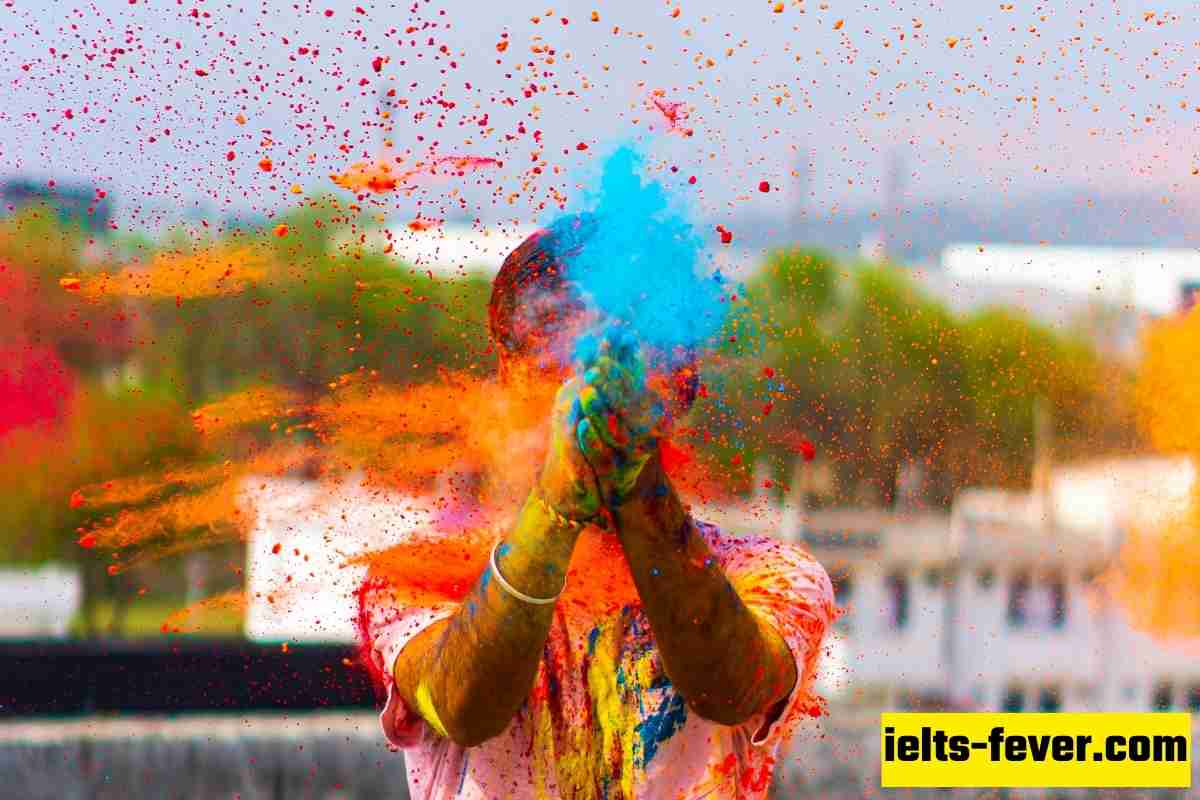Talk about an interesting tradition in your country. You should say:
- What is it?
- Who takes part in it?
- What activities are there?
- And explain how you feel about it?
Sample 1 Talk About an Interesting Tradition in Your Country
One interesting tradition in my country is Holi, also known as the Festival of Colors. It is a Hindu festival celebrated in India and Nepal, but it is also observed by other countries with significant Hindu populations.
During Holi, people gather in the streets and throw brightly colored powder and water at each other, sing and dance, and exchange sweets and snacks. It usually takes place in March and lasts for two days, with the first day known as Holika Dahan and the second as Rangwali Holi.
The festival has its roots in Hindu mythology, where it is said to symbolize the victory of good over evil. It is believed to commemorate the love between Lord Krishna and Radha, as well as the arrival of spring and the triumph of the harvest.
People of all ages, genders, and social classes take part in Holi. It is a time when social barriers are broken down, and people come together to celebrate and enjoy each other’s company.
Personally, I love Holi because it is a fun-filled festival that brings people together in a vibrant and colorful way. It is a time when people forget their differences and celebrate unity and diversity. I have fond memories of playing with my friends and family, throwing colors at each other and dancing to traditional music. It is a time of joy and celebration, and it never fails to bring a smile to my face.
In recent years, there has been a growing concern about the environmental impact of Holi, with many people using synthetic colors that can harm the skin and pollute the environment. However, there has also been a push towards using natural colors made from flowers and herbs, which is a positive step towards sustainability and environmental consciousness.
Overall, Holi is a wonderful tradition that celebrates love, unity, and the arrival of spring. It is a time when people can let go of their inhibitions and come together to enjoy life in all its vibrant colors.
Follow ups of Talk About an Interesting Tradition in Your Country
Question 1 Do you think teenagers should learn about traditions?
Answer – Yes, I think teenagers should learn about traditions. Traditions help to preserve cultural heritage, and they provide a sense of identity and belonging for individuals and communities. Learning about traditions also promotes an appreciation of diversity and tolerance, which are important values in a globalized world. Moreover, understanding and participating in traditions can foster a sense of continuity and connection to the past, which can be beneficial for personal development and well-being. Overall, learning about traditions is important for teenagers as it can help them to develop a greater understanding and respect for their own culture and those of others.
Question 2 What is the importance of traditional festivals?
Answer – Traditional festivals play an important role in preserving cultural heritage and identity. They provide an opportunity for people to come together and celebrate their shared values and beliefs. These festivals often involve customs and rituals that have been passed down for generations, reinforcing the connection between the past, present, and future. They also serve as a means of transmitting cultural knowledge and traditions to younger generations, ensuring their continuity. Additionally, traditional festivals can boost local economies by attracting tourists and promoting cultural exchange. Overall, traditional festivals help to maintain a sense of community and cultural pride while also providing an opportunity for enjoyment and celebration.
Question 3 What’s the difference between festivals now and in the past?
Answer – Festivals in the past were often celebrated with more religious and cultural significance, and were rooted in traditional customs and beliefs. Nowadays, many festivals have become more commercialized and less focused on their original meanings. Modern festivals often incorporate popular culture and entertainment, attracting large crowds for music, food, and other activities. Additionally, advances in technology have led to new forms of celebration and virtual participation, such as online gatherings and live streaming of events. Despite these changes, many traditional festivals still continue to be celebrated and hold great significance for the communities that observe them.
Question 4 Do you think western festivals like Christmas are replacing traditional festivals in your country?
Answer – In my opinion, Western festivals such as Christmas are not replacing traditional festivals in my country. Although these festivals have gained popularity in recent years, traditional festivals continue to be celebrated with great enthusiasm and are deeply rooted in our culture. While Christmas has become more commercialized and is widely celebrated in urban areas, traditional festivals such as Diwali, Holi, and Eid are still widely celebrated in both urban and rural areas. These festivals are an integral part of our culture and provide a sense of belonging and community. Furthermore, many people celebrate both traditional and Western festivals, and it is not a matter of one replacing the other.
Question 5 Do you think it is wrong for children not to celebrate traditional festivals?
Answer – From my perspective, it is not necessarily wrong for children not to celebrate traditional festivals. However, it would be beneficial for them to learn about their cultural heritage and the significance of these festivals. Celebrating traditional festivals can help children develop a sense of identity and belonging to their community. Additionally, participating in cultural activities can provide opportunities for families to bond and create lasting memories together. It is important to strike a balance between embracing new traditions and maintaining cultural traditions.

